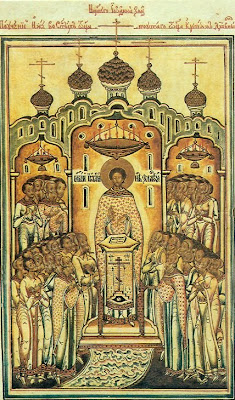 St John Chrysostom
St John Chrysostom, commenting on
Psalm 46 [47], writes:
All the nations, clap your hands (another version, “hand”). Shout to God in a voice of happiness (a different version says, “Indicate in a voice of praise”). Because the Lord most high is fearsome, great king over all the earth (vv. 1-2). This psalm, too, has to do with the same subject, speaking of victories and the trophies that result from fighting against enemies, and inviting the whole world to commendation of the achievements. Some people, however, may find the opening of the divine Spirit’s exhortation unworthy – such a bidding, applause, din, loud cries. These things perhaps do not become people assembling in this place dedicated to teaching, you will say, but rather those indulging in the theater and banquets, shaking rattles and applauding, whereas to men under the guidance of the grace of the Spirit tranquility and good order are appropriate. So what does the verse intend to suggest: what shouting, what clapping does it refer to? This, after all, is customary behaviour also for those is battle formation – I mean shouting and clapping for the purpose of unnerving the enemy – whereas it is foreign to the peaceful soul. The psalm, however, requires both, clapping and shouting.
So what on earth is it saying? Nothing other than giving an indication of satisfaction and a signal of victory. For the inspired author elsewhere, too, presents rivers as applauding: “Rivers, applaud this very thing,” he says [Ps 97 [98]:8]. Isaiah presents the trees also doing it [Is 55:12], while the psalmist again mountains leaping, and hills too, not for us to get the idea that mountains leap, and hills too [Ps 113 [114]:4], nor that rivers applaud or have hands (the height of folly, of course), but to learn the high degree of satisfaction. This is just what you can see in the case of human beings as well. Why did he not say “Rejoice” and “Leap,” but Clap and Shout? To show our satisfaction of a high degree. You see, just as Christ, when he says “You, on the contrary, when you fast, put oil on your head and wash your face,” [Mt 6: 12] is bidding not that anointing occur (none of us does this, after all) but that satisfaction be shown and there be joy in attitude (he bids the person be happy in fasting, you see, not sullen), so too here he did not give this direction for us to clap our hands but to be pleased and happy in our hymn singing.
Now, you would be right in taking the psalm more in a spiritual sense, rising above the literal sense. I mean, even if he bases the opening and introduction on material things, nevertheless he guides the listener to an intellectual level. In fact, what I said before I will say now, too: some things are to be taken at face value, others in a way different from their surface meaning, as is the case in that saying, “Wolves and sheep shall graze together” [cf., Is. 11:6-7]. We do not take this to mean wolves and sheep, nor chaff, nor ox, nor bull; instead, we depict the ways of human beings through the comparison with brute beasts. Some things have two levels of meaning: we both understand them at the material level and taken them at an intellectual level, as in the case of the anagogy of Abraham’s son [cf., Gen 22]: we know the son was offered in sacrifice, and we gather something else contained in the thought by mention of the son, namely, the Cross. In the case of the lamb in Egypt [cf., Ex 12], too, we likewise bring out the comparison with the Passion. In this verse we must do exactly the same; the reference, you see, is not simply to the Arabs and their neighbors – rather, he is summoning all nations.
Taken from Robert Charles Hill’s
translation. For my brief summary of the principles of patristic exegesis, see
here; for more on applause and clapping, see
here. The translator notes that St John is here preaching not in church but in a “place dedicated to teaching” (
didaskaleion).
 St John Chrysostom, commenting on Psalm 46 [47], writes:
St John Chrysostom, commenting on Psalm 46 [47], writes:








No comments:
Post a Comment